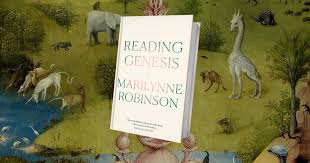27th July 2025

Holiday Reading & Listening:
Reading Genesis - Marilynne Robinson
It's been a while since I did a summer reading series, so I thought I'd return over this holiday season to some of the books and, potentially, the podcasts, that have nourished me over recent months and offer them to you in case you were looking for something a little different to enjoy in the garden, on the beach or even simply on the train to Victoria...
My first book recommendation is Reading Genesis, by Marilynne Robinson. In this book, a literary commentary on Genesis, Robinson encourages us, as modern readers, to grasp just how unusual Genesis actually is as a book. Her starting point is that it is less important to know whether the incidents related in Genesis actually happens than it is to read them as "an articulation of a complex statement about reality" (p3).
At the heart of this complex statement about reality is the conviction that human beings are central to God's creation - that God made us not - as contemporary creation myths declared - to serve him, but to live in joyful relationship with him. Not only this, but God made us autonomous creatures within his creation, with the power to change it, both for the better and for the worse. And, beyond this, God loves his human creatures, flawed and fragile though we are. The stories of the patriarchs, Robinson argues, are important precisely in their lack of importance. Abraham, Isaac, Jacob, Joseph are not at the outset cast in the mould of the heroes of, eg. Greek myth. They are ordinary people - nomads, wandering in a wilderness, making a life for themselves. In the text, their flaws come across just as clearly as their virtues. And yet - God loves them. God speaks to them. God calls them, by name, into a living relationship and, as they learn to hear God's voice and walk with him, so they gain their significance. If God does this for ordinary people like Abraham, Isaac and Jacob, wonders Robinson, how many others may have heard that same voice, followed those same paths, grown in that same relationship? And so, the ancient stories of Genesis become our story.
I found this to be a hugely attractive and beautifully written reading of the text, and one which did not shy away from some of the difficulties of the patriarchal narratives - for example the treatment of Hagar, the Egyptian slave girl, by Abraham and Sarah. Robinson notes that it is Hagar, the slave, who is the first in the Bible to give a name to God. It merits slow, careful reading, because every word is chosen so carefully. It takes us deep into these old, old stories and shows us something of God and his ways in the world, and something of ourselves and our response to God.
